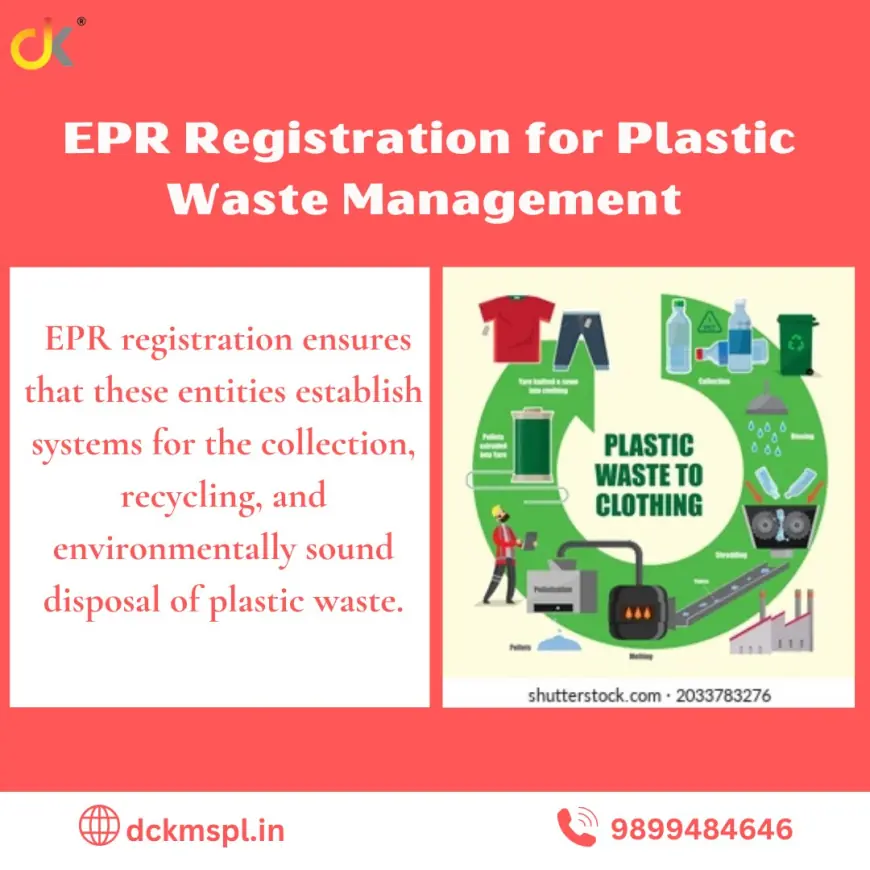EPR Registration for Plastic Waste Management: A Comprehensive Guide
With growing awareness and stricter regulations, EPR is poised to play a pivotal role in plastic waste management. Innovations in recycling technology, the rise of biodegradable plastics, and global collaborations will further enhance EPR’s effectiveness.Governments are expected to introduce more robust monitoring mechanisms, ensuring accountability and encouraging businesses to adopt sustainable practices.

The rapid growth of industrialization and urbanization has resulted in a significant rise in plastic waste globally. To tackle the environmental challenges posed by plastic waste, Extended Producer Responsibility (EPR) has emerged as a critical regulatory framework. EPR mandates producers, importers, and brand owners (PIBOs) to take responsibility for the collection, recycling, and environmentally friendly disposal of plastic waste. This article delves into the nuances of EPR registration for plastic waste management, highlighting its importance, process, and benefits.
Understanding EPR for Plastic Waste Management
EPR registration for plastic waste management is a policy approach where producers bear the financial and operational responsibility for the post-consumer phase of their products. In the context of plastic waste, this involves managing the lifecycle of plastic products, from production to disposal. The goal is to reduce plastic pollution, promote recycling, and encourage eco-friendly packaging practices.
Why EPR Registration is Crucial
-
Environmental Conservation
Plastic waste significantly impacts ecosystems, harming wildlife and polluting water bodies. EPR ensures systematic waste management, reducing plastic leakage into the environment. -
Regulatory Compliance
Governments worldwide have implemented stringent regulations for managing plastic waste. EPR registration ensures that businesses comply with these laws, avoiding hefty penalties. -
Corporate Social Responsibility (CSR)
Companies with EPR certification showcase their commitment to sustainability, enhancing their brand image and attracting eco-conscious consumers. -
Circular Economy Promotion
EPR fosters a circular economy by encouraging recycling and reuse of materials, reducing dependency on virgin resources.
Steps for EPR Registration
1. Identification of Obligations
Producers, importers, and brand owners must first determine their EPR obligations based on the quantity and type of plastic they use.
2. Preparation of EPR Plan
Companies must prepare a detailed EPR plan outlining their strategies for waste collection, transportation, recycling, or disposal.
3. Application Submission
The EPR application, along with the necessary documents, should be submitted to the relevant authority. Key documents include:
-
Business registration certificate
-
Details of plastic usage and waste generated
-
EPR plan
4. Approval from the Pollution Control Board
The Pollution Control Board (PCB) evaluates the application and, if satisfied, grants EPR certification.
5. Implementation and Monitoring
Once approved, businesses must implement their EPR plan and periodically report their progress to the PCB.
Challenges in EPR Registration
-
Complex Compliance Procedures
Navigating the regulatory framework and preparing the required documentation can be daunting, especially for small and medium-sized enterprises (SMEs). -
High Implementation Costs
Setting up collection and recycling infrastructure demands significant investment, posing a challenge for many businesses. -
Lack of Awareness
Many businesses remain unaware of their EPR obligations, resulting in non-compliance and penalties. -
Inefficient Waste Collection Systems
Inadequate infrastructure for collecting and segregating plastic waste hampers effective EPR implementation.
How to Overcome EPR Challenges
-
Leverage Professional Assistance
Hiring consultants or service providers specializing in EPR registration can simplify compliance and streamline the process. -
Adopt Technological Solutions
Utilize technology to track and monitor waste management efforts, ensuring transparency and efficiency. -
Collaborate with Stakeholders
Partnering with recyclers, waste collectors, and non-governmental organizations (NGOs) can enhance the effectiveness of EPR initiatives. -
Awareness Campaigns
Conduct training programs and workshops to educate stakeholders about the importance of EPR and compliance requirements.
Benefits of EPR Registration
-
Improved Environmental Impact
Proper plastic waste management reduces pollution, conserving natural resources and protecting biodiversity. -
Enhanced Brand Value
Businesses with EPR certification gain a competitive edge by showcasing their commitment to sustainability. -
Cost Savings in the Long Run
Efficient waste management reduces operational costs over time, making EPR a cost-effective solution. -
Access to Global Markets
Many countries prioritize imports from businesses adhering to environmental regulations, expanding market opportunities for EPR-compliant firms.
Case Studies: Successful EPR Implementation
-
India
In India, the Plastic Waste Management Rules, 2016, introduced mandatory EPR for PIBOs. Companies like Hindustan Unilever have successfully implemented EPR by collaborating with recyclers and waste management firms, achieving significant waste recovery targets. -
European Union
The EU's Packaging and Packaging Waste Directive has driven member states to achieve high recycling rates for plastic packaging. Businesses in the EU often collaborate with Producer Responsibility Organizations (PROs) to meet EPR requirements.
Future of EPR in Plastic Waste Management
With growing awareness and stricter regulations, EPR is poised to play a pivotal role in plastic waste management. Innovations in recycling technology, the rise of biodegradable plastics, and global collaborations will further enhance EPR’s effectiveness.Governments are expected to introduce more robust monitoring mechanisms, ensuring accountability and encouraging businesses to adopt sustainable practices.
Conclusion
EPR registration for plastic waste management is not merely a regulatory requirement but a stepping stone toward a sustainable future. By taking responsibility for the entire lifecycle of their products, businesses can significantly reduce their environmental impact while enhancing their brand reputation.While challenges persist, proactive strategies, stakeholder collaboration, and technological advancements can ensure successful EPR implementation. For businesses, adhering to EPR regulations is not just a compliance necessity but an opportunity to lead the change toward a cleaner and greener planet.Let’s embrace EPR as a collective responsibility and take decisive steps to manage plastic waste effectively.
What's Your Reaction?
 Like
0
Like
0
 Dislike
0
Dislike
0
 Love
0
Love
0
 Funny
0
Funny
0
 Angry
0
Angry
0
 Sad
0
Sad
0
 Wow
0
Wow
0













































